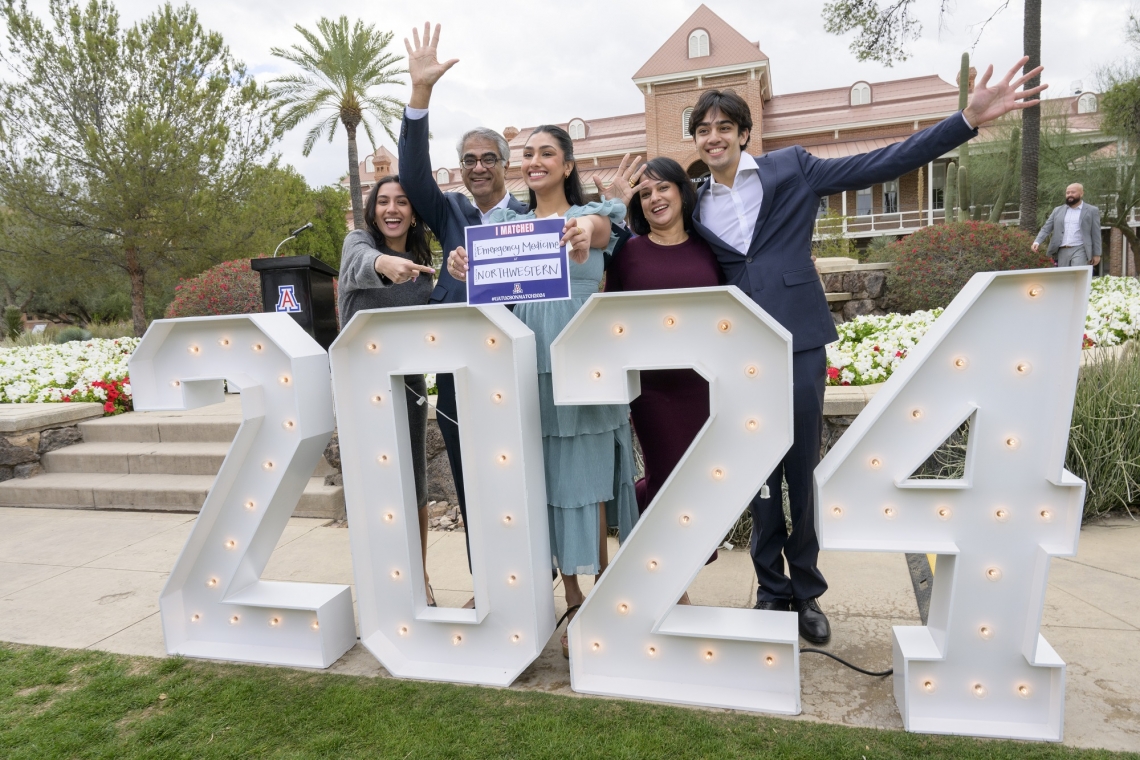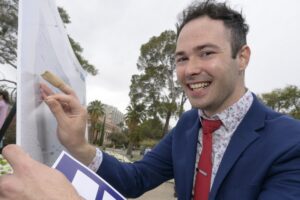Fourth-year students at the College of Medicine – Tucson and the College of Medicine – Phoenix learned where their journey to become physicians will take them next.

College of Medicine – Tucson students matched at 66 graduate medical education training centers in 29 states and the District of Columbia. (UArizona Health Sciences)
Four years ago, medical students at the University of Arizona College of Medicine – Tucson and the College of Medicine – Phoenix began their studies amidst a global pandemic. During annual Match Day ceremonies, the students, who persevered through COVID-19, virtual classrooms, rigorous coursework and board exams, found out where they will complete their residency training.
On March 15 at 9 a.m., cheers erupted outside Old Main in Tucson, Arizona, and the Arizona Science Center in Phoenix as about 200 students learned where their journey to become physicians will take them next.
The Tucson and Phoenix scenes were repeated at campuses around the United States as more than 40,000 soon-to-be graduates from medical schools took part in the annual tradition, simultaneously learning where they were placed by the National Residency Matching Program.
“There are moments in life that you never forget – when you meet the love of your life, when, or if, you have children,” said Dr. Fred Wondisford, dean of the College of Medicine – Phoenix, as he addressed students on Match Day. “I guarantee you this, Match Day will become one of those moments. So, take a breath. Savor the moment.”

College of Medicine – Phoenix student Jovanna Figueroa poses in front of the Match Day map.(UArizona Health Sciences)
College of Medicine – Phoenix students are headed to 23 states to complete their residencies at facilities including Walter Reed Medical Center, The Mayo Clinic, Yale-New Haven Hospital, Stanford Health Care, Cornell Medical Center, UCLA Medical Center, Tufts Medical Center and Mass General Brigham.
College of Medicine – Tucson students matched at 66 graduate medical education training centers in 29 states and the District of Columbia at institutions including Stanford Health Care, UCLA Medical Center, McGaw Medical Center of Northwestern University, Duke University Medical Center, The Mayo Clinic, Beth Israel Deaconess Medical Center, Brown University and Banner – University Medical Center.
“You will always remember today, your Match Day, as I remember mine,” Dr. Michael Abecassis, dean of the College of Medicine – Tucson, told students on Match Day. “The realization that the current leg of your journey is nearly over, and being rewarded, combined with the contemplation of the next leg makes for mixed emotions. It is a time filled with great anticipation and uncertainty. I would like to offer you all my deepest congratulations. You should be proud of what you have accomplished so far – and confident in your ability to succeed in this next chapter.”
Residencies generally start in July, and residents are required to go to the institution to which they matched. A total of 45 students from both colleges matched with Banner – University Medicine residency programs in Tucson and Phoenix.
“We extend our sincere congratulations to all the medical students who participated in Match Day,” said Dr. Venkata “Bob” Evani, CEO of Banner – University Medical Group and president of Banner Academics. “Many of these students began medical school right before the COVID-19 pandemic began to spread across the nation and we honor their adaptation, resiliency and dedication and welcome them in their new roles as the future of medicine.”
The soon-to-be graduates include some recipients of the University of Arizona Health Sciences Primary Care Physician Scholarship Program, which was established in 2019 to help address the need for primary care physicians in the state. The scholarships cover tuition for medical students willing to practice in one of seven primary care fields in an underserved area of Arizona upon the completion of their residencies.
One of those scholarship recipients was College of Medicine – Phoenix student Jovanna Figueroa, who will specialize in family medicine and matched with Creighton University-Arizona.
“The opportunity to be a patient’s first point of contact, guiding them through life’s challenges and triumphs, is a privilege I cherish,” said Figueroa, a Phoenix native. “Whether it’s managing chronic conditions, delivering a baby or supporting a family through difficult times, family medicine allows me to make a meaningful impact across generations.”

College of Medicine – Tucson student Gregory Branigan. (UArizona Health Sciences)
Gregory Branigan started the College of Medicine – Tucson’s M.D./Ph.D. program in 2017. He earned a doctorate in medical pharmacology in 2021 and will receive his medical degree in May.
As a graduate student, he reviewed medical records of breast cancer patients and noticed that certain medications might lower Alzheimer’s risk, opening investigation into how these drugs could serve dual purposes. He hopes to continue this “open conversation” between the clinic and the lab.
“Research and medicine go hand in hand,” said Branigan, who matched to a neurology residency program at Stanford University. “Alzheimer’s is a field where we need a lot of love in our clinical care and a lot of innovation in our research.”
Match Day highlights:
- 27.9% of College of Medicine – Tucson graduates will complete their residencies in Arizona.
- 39% of College of Medicine – Phoenix graduates will complete all or part of their residency training in Arizona.
- A total of 45 graduates matched with Banner – University Medical Center residency programs in Tucson and Phoenix.
- 51% of College of Medicine – Tucson graduates matched into residencies in primary care fields, defined as family medicine, internal medicine, pediatrics and obstetrics/gynecology.
- Almost 32% of College of Medicine – Phoenix graduates are entering primary care specialties, including family medicine, internal medicine, pediatrics and Med-Peds.
